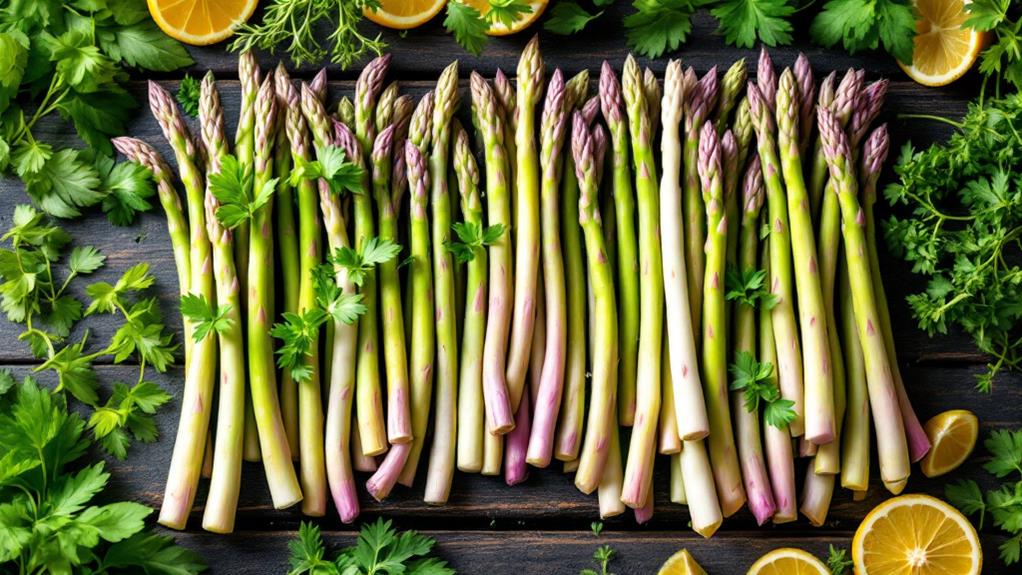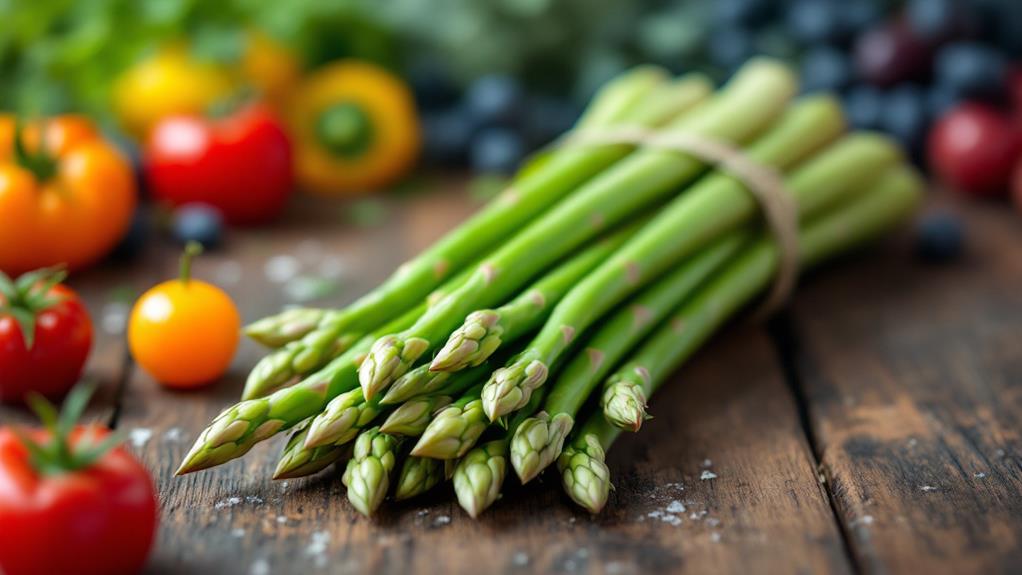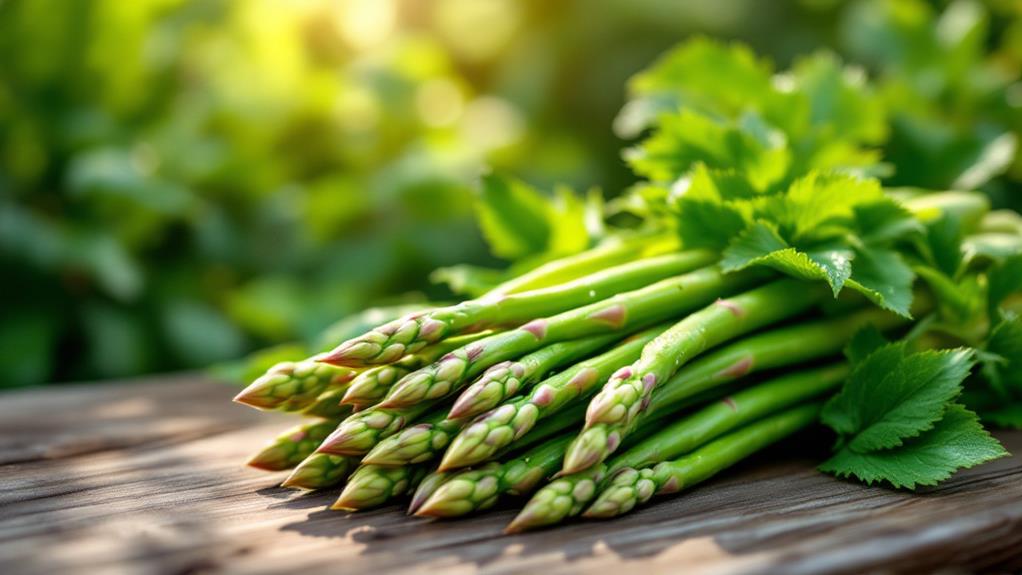Guide to the Types and Health Benefits of Asparagus

Asparagus comes in numerous types, including green, white, and purple, each offering unique flavors and nutritional perks. Green asparagus is robust and versatile, while white boasts a milder taste, perfect for gourmet dishes. Purple asparagus is sweeter with extra antioxidants. Consuming asparagus supports digestion, weight management, and heart health, thanks to its low calories, high fiber, vitamin K, and folate. It's also rich in vitamins A, C, and E, promoting overall well-being and reducing chronic disease risk. Different cooking methods like roasting and steaming preserve its benefits. For a deeper exploration into maximizing asparagus in your kitchen, continue on.
Varieties of Asparagus
When exploring the world of asparagus, you'll find that there are several intriguing varieties to contemplate. The most common is green asparagus, celebrated for its lively hue and robust flavor. It's packed with vitamins A, C, and K, making it a staple in many kitchens. Its versatility in culinary use allows you to enjoy it grilled, steamed, or even raw in salads. Then there's white asparagus, a prized delicacy in European cuisine. It's grown underground to avoid chlorophyll, resulting in a milder taste. This type of asparagus often graces gourmet dishes and brings a unique touch to any meal.
Purple asparagus stands out with its sweeter flavor and higher content of antioxidants, especially anthocyanins, which lend it its rich color. This variety not only adds a pop of color to your plate but also enhances your intake of health-benefiting compounds. While these are the main types of asparagus used in cooking, don't forget about ornamental varieties like the asparagus fern, though they're more for show than taste.
To grow any type of asparagus successfully, guarantee well-drained soil and full sun, echoing conditions found in major producing countries like China, Thailand, and Mexico.
Nutritional Benefits
How can such a humble vegetable pack so much nutritional power? Asparagus is a powerhouse of goodness, offering numerous nutritional benefits. To begin with, it's low in calories, with just about 27 calories per cup. Despite being low-calorie, it's rich in crucial nutrients like fiber and protein, providing 2.8g of fiber and 3g of protein per serving. This makes it a perfect enhancement to your diet without the worry of extra calories.
Consider these impressive benefits:
- Vitamin K: Asparagus gives you nearly 46% of your daily value, necessary for blood clotting and bone health.
- Folate: It offers around 17% of the daily value, significant for women planning pregnancy, as it supports fetal development.
- Antioxidants: Packed with vitamins A, C, E, and glutathione, asparagus helps combat oxidative stress, potentially reducing cancer risk.
Furthermore, asparagus is rich in potassium, a mineral known for regulating blood pressure and promoting heart health. Its fiber content also supports digestive health. With all these benefits, incorporating asparagus into your diet can be a delicious and effective way to enhance your general health.
Health Advantages

Beyond its impressive nutritional profile, asparagus offers remarkable health advantages that make it a worthy improvement to your meals. Packed with vitamins A, C, E, and K, asparagus provides key nutrients that support general health. Vitamin K is fundamental for blood clotting and bone health, with just one cup offering nearly 57% of your daily needs.
Asparagus is also a fantastic source of dietary fiber, with 2.8 grams per cup. This fiber promotes digestive health by encouraging regular bowel movements and nurturing beneficial gut bacteria. The high fiber content helps with weight management by keeping you full longer, reducing the urge to snack and aiding in controlling calorie intake.
Potassium, found abundantly in asparagus, plays a significant role in regulating blood pressure, thereby potentially lowering the risk of cardiovascular issues. Folate, another key nutrient in asparagus, supports heart health and is especially significant for women during pregnancy. The antioxidants glutathione and flavonoids in asparagus combat oxidative stress, which may lower the risk of chronic diseases, including certain cancers.
Incorporating asparagus into your diet offers these substantial health benefits, making it much more than just a tasty vegetable on your plate.
Cooking Techniques
Exploring the adaptable world of asparagus preparation opens up a range of delicious possibilities. With several cooking methods at your disposal, you can improve both the flavor and nutritional value of this nutritious vegetable. Here's a guide to get you started:
- Steaming: This method is perfect for preserving asparagus's lively color and nutrients. Simply steam the spears for about 3-5 minutes to achieve a tender-crisp texture. It's a fantastic way to keep things light and healthy.
- Roasting: If you're in the mood for something a bit richer, try roasting. Drizzle asparagus with olive oil and bake in the oven at 400°F (204°C) for 15-20 minutes. This brings out its natural sweetness and provides a slightly crisp exterior.
- Sautéing: For a flavorful enhancement to any meal, sautéing is a great choice. Cook the asparagus in a pan with garlic and olive oil for 5-7 minutes. It's quick and easy, adding depth to your dishes.
Grilling is another method worth trying, offering a smoky flavor that pairs well with diverse cuisines. Each of these methods allows you to enjoy asparagus's delightful taste and texture.
Seasonal Tips

Asparagus is typically at its freshest and most flavorful from March to May, making this the perfect time to savor its unique taste. During this season, asparagus reaches peak freshness, ensuring you get the most health benefits from this nutrient-rich vegetable. When selecting asparagus, choose spears with compact tips and a lively green color. These are signs of ideal freshness and flavor, ensuring you enjoy the best culinary experience.
Once you've chosen the perfect bunch, proper storage is key to maintaining its quality. Store asparagus in the refrigerator wrapped in a damp paper towel or stand it upright in water. This method keeps it crisp and fresh for up to a week. However, for the best taste, consume it within three days of purchase. Asparagus is most tender and flavorful during this period, enhancing your dishes considerably.
If you plan to keep asparagus longer, consider blanching it before freezing. Blanching preserves its nutritional value and flavor, making it a great option for long-term storage. Enjoy the health benefits of asparagus all year round by following these seasonal tips!




